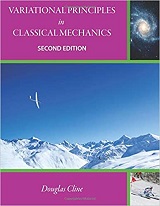
|
FreeComputerBooks.com
Links to Free Computer, Mathematics, Technical Books all over the World
|
|
- Title: Variational Principles in Classical Mechanics
- Author(s) Douglas Cline
- Publisher: River Campus Libraries; 2nd edition (August 1, 2018); eBook (January 15, 2019)
- License(s): CC BY-NC-SA 4.0
- Paperback: 598 pages
- eBook: PDF (589 pages)
- Language: English
- ISBN-10: 099883727X
- ISBN-13: 978-0998837277
- Share This:

|
Two dramatically different philosophical approaches to classical mechanics were proposed during the 17th – 18th centuries. Newton developed his vectorial formulation that uses time-dependent differential equations of motion to relate vector observables like force and rate of change of momentum. Euler, Lagrange, Hamilton, and Jacobi, developed powerful alternative variational formulations based on the assumption that nature follows the principle of least action. These variational formulations now play a pivotal role in science and engineering.
This book introduces variational principles and their application to classical mechanics. The relative merits of the intuitive Newtonian vectorial formulation, and the more powerful variational formulations are compared. Applications to a wide variety of topics illustrate the intellectual beauty, remarkable power, and broad scope provided by use of variational principles in physics.
This second edition adds discussion of the use of variational principles applied to the following topics: 1) Systems subject to initial boundary conditions 2) The hierarchy of the related formulations based on action, Lagrangian, Hamiltonian, and equations of motion, to systems that involve symmetries 3) Non-conservative systems. 4) Variable-mass systems. 5) The General Theory of Relativity.
About the Authors- Douglas Cline is a Professor of Physics at University of Rochester.
- Physics, Computational Physics, and Mathematical Physics
- Applied Mathematics
- Calculus and Mathematical Analysis (Real Analysis, Functional Analysis, etc.)
 Similar Books:
Similar Books:
-
 Principles of Mechanics: Fundamental University Physics
Principles of Mechanics: Fundamental University Physics
This textbook takes the reader step-by-step through the concepts of mechanics in a clear and detailed manner. Many proofs and examples are included to help the reader grasp the fundamentals fully, paving the way to deal with more advanced topics.
-
 Structure and Interpretation of Classical Mechanics
Structure and Interpretation of Classical Mechanics
This innovative textbook concentrates on developing general methods for studying the behavior of classical systems. It focuses on the phenomenon of motion and makes extensive use of computer simulation in its explorations of the topic.
-
 Lecture Notes on Classical Mechanics (Sunil Golwala)
Lecture Notes on Classical Mechanics (Sunil Golwala)
You will learn a variety of new techniques and formalism that will allow you to attack a wider set of problems than you saw in the introductory sequences, more unified understanding of the structure and fundamental principles of classical physics.
-
 The Feynman Lectures on Physics (Richard P. Feynman, et al.)
The Feynman Lectures on Physics (Richard P. Feynman, et al.)
Ranging from the most basic principles of Newtonian physics through such formidable theories as general relativity and quantum mechanics, Feynman's lectures stand as a monument of clear exposition and deep insight.
-
 The Physics of Quantum Mechanics (James Binney, et al.)
The Physics of Quantum Mechanics (James Binney, et al.)
This book aims to give students a good understanding of how quantum mechanics describes the material world. It shows that the theory follows naturally from the use of probability amplitudes to derive probabilities.
-
 The Key to Newton's Dynamics (J. Bruce Brackenridge)
The Key to Newton's Dynamics (J. Bruce Brackenridge)
This book clearly explains the surprisingly simple analytical structure that underlies the determination of the force necessary to maintain ideal planetary motion, sets the problem in historical and conceptual perspective, showing the works of both Descartes and Galileo.
-
 Statistical Mechanics of Lattice Systems: Mathematical Introduction
Statistical Mechanics of Lattice Systems: Mathematical Introduction
This motivating textbook gives a friendly, rigorous introduction to fundamental concepts in equilibrium statistical mechanics, covering a selection of specific models, including the Curie–Weiss and Ising models, the Gaussian free field, etc.
-
 Relativity: The Special and General Theory (Albert Einstein)
Relativity: The Special and General Theory (Albert Einstein)
The great physicist himself disclaimed this exclusionary view, and in this book, he explains both theories in their simplest and most intelligible form for the layman not versed in the mathematical foundations of theoretical physics.
-
 An Advanced Course in General Relativity (Eric Poisson)
An Advanced Course in General Relativity (Eric Poisson)
Focusing on conceptual clarity, he derives all the basic results in the simplest way, taking care to explain the physical, philosophical and mathematical ideas at the heart of "the most beautiful of all scientific theories".
-
 Quantum Computing Since Democritus (Scott Aaronson)
Quantum Computing Since Democritus (Scott Aaronson)
This book takes readers on a tour through some of the deepest ideas of maths, computer science and physics. Full of insights, arguments and philosophical perspectives, the book covers an amazing array of topics.





